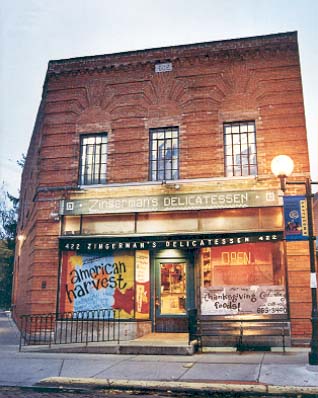The Loop’s lunch and dinner take-out business now accounts for 25 percent to 30 percent of its revenue, up sharply from the 5 percent to 10 percent it constituted 10 years ago.
“Time is a commodity that two working parents and school-age children don’t have enough of,” said Schneider. “We’re talking about home-replacement meals. It elevates fast- food eating to dining. My generation grew up on fast food and grew out of it.”
The National Restaurant Association reports that among restaurants with average checks of $25 or more, 70 percent offer carryout options. At the same time, the amount of time preparing meals at home continues to fall, according to an association survey in 2000. Nearly four in 10 adults said they were cooking fewer meals at home and 74 percent of adults said they found more restaurants to choose from than they had two years earlier.
Outback Steakhouse, a national chain with 18 restaurants in North Florida and South Georgia, is taking advantage of the trend. It offers curbside service that lets customers call in their order and then drive to the restaurant where they park in a designated space to await the delivery of their food.
Trends
Swiss inventors develop spaghetti plate
The spaghetti plate looks similar to any other, except that it has a ‘crater’ in the middle, a little like an egg cup. Eaters use the hole to help wind the spaghetti around their forks.
Read the article
Quarter-size cabbages for Japanese singletons
One of Japan’s leading supermarkets is to start stocking quarter-size cauliflowers and cabbages as part of a new dwarf vegetable range for single people.
Japanese retail giant Aeon said it had taken the decision to ramp up its mini- vegetable range after successful trials of half-size radishes.
“A growing number of people, especially in urban areas, live alone and they cannot consume large vegetables by themselves,” said company spokeswoman Naoko Ueda.
The mini versions of traditional vegetables have been developed by Switzerland’s biotechnology firm Syngenta Seeds, which prides itself on serving growers’ individual requirements.
MASSCLUSIVITY nyt Marketing Buzz word
The popularity of Royal-Class airport lounges and invitation-only Centurion credit cards are just two examples of modern man’s immense need for respect and privilege. The more access consumers have to outstanding quality goods and services (the DVD player in your living room probably doesn?t differ too much from the one Queen Elizabeth?s grandchildren use to watch ?Lord of the Rings?), the more they want exclusivity and status of a different order. The kind that visibly sets you apart from the masses and gives you access to privileges most others won?t get.
Links til artiklen og billeder i MORE [Read more…] about MASSCLUSIVITY nyt Marketing Buzz word
The coolest small company in America.. say Inc Magazine
In 1982, Weinzweig founded Zingerman’s Delicatessen with Paul Saginaw, who is still his partner. Over the next 10 years, the deli became world famous–and then hit a wall. Faced with the choice of changing the company or letting it stagnate, the partners came up with an ingenious strategy that has allowed them to retain the best aspects of small-business life while enjoying the benefits and challenges of growth. The result is ZCoB, consisting of seven small businesses in and around Ann Arbor, Mich., with two more in the active-planning stage. Together the businesses do a profitable $13 million a year in sales.
Check them out: https://www.zingermans.com/Index.pasp
and : https://www.easternecho.com/cgi-bin/story.cgi?4045
Read the article in USATODAY https://www.usatoday.com/money/industries/food/2003-10-01-deli_x.htm

Boutique hotel: Fænomen eller flop?
Begrebet ?Boutique hotel? har ca. 20 år på bagen, og de hippe ?life-style? hoteller i USA oplever nu en markant tilbagegang i besøgstallet. Spørgsmålet er, om boutique hotellerne har tabt pusten og deres tiltrækning, eller om tilbagegangen er en midlertidig reaktion på terrorangrebet 11. september 2001. underrubrik [Read more…] about Boutique hotel: Fænomen eller flop?